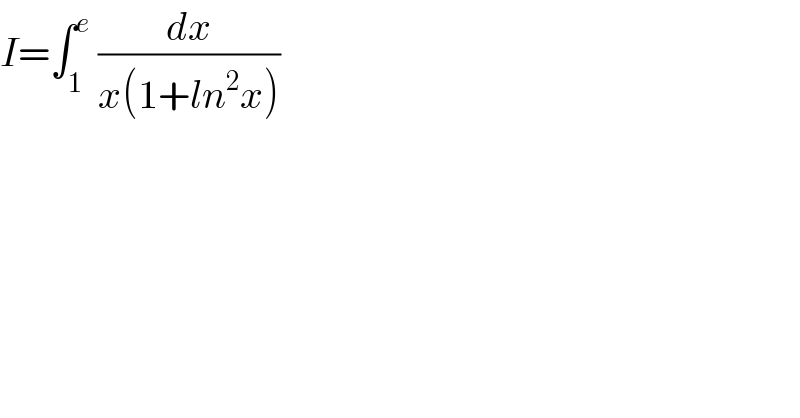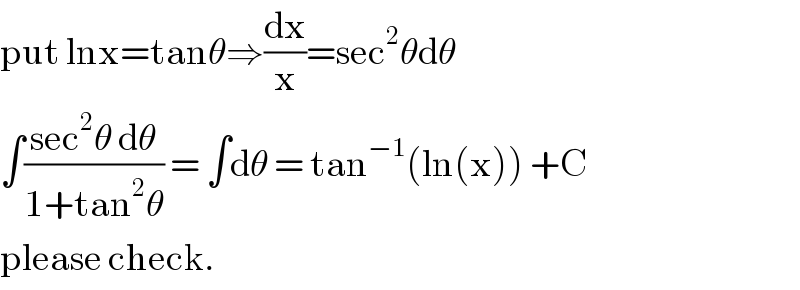
Question Number 65372 by aliesam last updated on 29/Jul/19

$${I}=\int_{\mathrm{1}} ^{{e}} \:\frac{{dx}}{{x}\left(\mathrm{1}+{ln}^{\mathrm{2}} {x}\right)} \\ $$
Commented by Prithwish sen last updated on 29/Jul/19

$$\mathrm{put}\:\mathrm{lnx}=\mathrm{tan}\theta\Rightarrow\frac{\mathrm{dx}}{\mathrm{x}}=\mathrm{sec}^{\mathrm{2}} \theta\mathrm{d}\theta \\ $$$$\int\frac{\mathrm{sec}^{\mathrm{2}} \theta\:\mathrm{d}\theta}{\mathrm{1}+\mathrm{tan}^{\mathrm{2}} \theta}\:=\:\int\mathrm{d}\theta\:=\:\mathrm{tan}^{−\mathrm{1}} \left(\mathrm{ln}\left(\mathrm{x}\right)\right)\:+\mathrm{C} \\ $$$$\mathrm{please}\:\mathrm{check}. \\ $$
Commented by mathmax by abdo last updated on 29/Jul/19
![changement lnx =t give I =∫_0 ^1 ((e^t dt)/(e^t (1+t^2 ))) =∫_0 ^1 (dt/(1+t^2 )) =[arctant]_0 ^1 =(π/4)](Q65378.png)
$${changement}\:{lnx}\:={t}\:{give}\:{I}\:=\int_{\mathrm{0}} ^{\mathrm{1}} \:\:\:\frac{{e}^{{t}} \:{dt}}{{e}^{{t}} \left(\mathrm{1}+{t}^{\mathrm{2}} \right)}\:=\int_{\mathrm{0}} ^{\mathrm{1}} \:\frac{{dt}}{\mathrm{1}+{t}^{\mathrm{2}} } \\ $$$$=\left[{arctant}\right]_{\mathrm{0}} ^{\mathrm{1}} \:=\frac{\pi}{\mathrm{4}} \\ $$
Commented by MJS last updated on 31/Jul/19

$$\mathrm{great}\:\mathrm{solution},\:\mathrm{Sir}\:\mathrm{Prithwish}! \\ $$
Commented by Prithwish sen last updated on 31/Jul/19

$$\mathrm{thank}\:\mathrm{you}\:\mathrm{sir}\:. \\ $$
